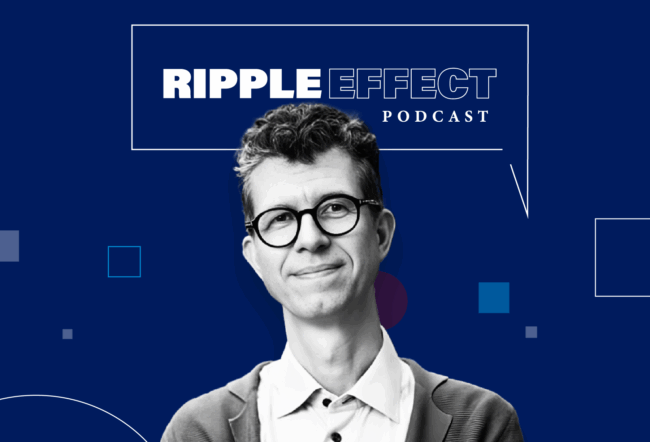At a recent leadership talk at Wharton, Edith Cooper, Goldman Sachs’ global head of human capital management, recounted that years ago she had a reverse mentor who was gay. Before that time, she’d had little contact with anyone in the LGBTQ community. Cooper became close with her young mentor and as they talked one day, she ventured to ask her why it would be necessary to identify oneself at work as being gay. Wasn’t it instead “kind of what you do in your personal life?”
The mentor explained that if she didn’t come out to her co-workers, she would inevitably find herself in uncomfortable conversations about how she spent time outside the office. Even the standard Monday morning chat about “what you did over the weekend” would be fraught. While others talked about their husband or wife, the mentor would have to refer vaguely to some “friend” instead of “my partner” or “my girlfriend,” avoiding any details.
Cooper said that some might feel she shouldn’t have asked the mentor the question for fear of causing offense. But, she said, “I didn’t know, and I was in a safe place [to ask].” Cooper observed that from the conversation she gained greater tolerance as well as a deeper appreciation of “how important it is for people to bring their true selves to work.”
Enabling difficult but productive conversations about race, religion, nationality, gender, sexual orientation and disability among Goldman Sachs’s 35,000 employees is one of Cooper’s major goals. Cooper, who became an executive vice president at Goldman six years ago and has led the human capital management team since 2008, has appeared on the Most Powerful Women lists of both Crain’s and American Banker. It’s been noted that she is one of the highest-ranking black women on Wall Street. After stepping down at the end of 2017, she will remain one of Goldman’s senior directors.
The Elephant in the Room
Some may remember Cooper’s much-discussed LinkedIn Influencer post from about a year ago titled “Why Goldman Sachs is encouraging employees to talk about race at work – and why as a black woman I think this is so important.” The article generated nearly 17,000 likes and almost 2,000 comments.
“Anything that we do for our under-represented population benefits everyone.”
In it, Cooper candidly described some of her frustrations as a black woman in finance; for example, being asked to serve coffee at a meeting she was actually there to run, and being asked “how she got into” Harvard. She also recounted personal tribulations such as being mistaken for a coat-check worker at her son’s school, and of being told that she wasn’t “black black” because of her comfortable upbringing and professional success.
Cooper noted how she became motivated to write the article. “I’m in a role where I am responsible for the people of the firm … I just asked myself the question, if not me, who’s going to do it?” She felt she should relate her story in a way that encouraged others to share theirs.
Another motivating factor was recent events in the news. “We had come from a very difficult summer where two black men had been shot by police.” She believed, and her CEO Lloyd Blankfein agreed, that many black professionals at the firm as well as other employees might feel uncomfortable working at a company where there was “no real conversation” around diversity.
Around the same time the article came out, said Cooper, Blankfein sent a voicemail to Goldman Sachs employees calling for an internal meeting. In the message he basically said that he was troubled by recent events and wanted to ensure the firm was an environment where everyone could feel at ease and perform to their potential. Cooper described the meeting as “a real big game changer,” saying she would never forget the moment she saw that the large auditorium was packed, with people even standing in the aisles. Feedback afterward was overall positive, and the stories some employees shared with Cooper as a result were “incredible,” she said.
She got an email, for example, from a hearing-impaired colleague who had been concealing the disability, doing things like showing up to meetings a half-hour early to be assured a seat close to the speaker. “Now I feel comfortable saying to my boss, I can’t hear you unless I’m sitting next to you,” the person said. Cooper also heard from a Muslim colleague who had a Jewish last name because her husband was Jewish and had long had to tolerate certain co-workers’ anti-Muslim comments. The meeting inspired her to confront the behavior and offer a serious conversation about her religion instead.
Cooper pointed out that raising awareness about diversity not only improves employee morale and well-being but also boosts the quality of a firm’s work. “You’re sitting in a [meeting] room and you’re [suddenly] conscious of the person who’s different and never says something. Then you start realizing, ‘hey, I’m only hearing from the same two people, I’ve got to fix that.’” This leads to better ideas, better conversations, and greater impact, she said.
The Black Analyst Initiative
Cooper added that it’s important to handle the human capital management process in a holistic way. Historically, Goldman had focused too much on recruiting — getting the bodies in the door — without really measuring how people performed over time. She noted that this wasn’t a productive approach for a commercial enterprise, and that on her watch she had worked to establish a continuum that linked recruitment, promotion, retention and advancement. “We pay attention every step of the way.”
“Who do you spend your time with in casual interactions? Literally, write it down at the end of the day.”
For example, the company had begun to improve its numbers in terms of hiring black analysts. But they weren’t staying. At one point she realized that in some divisions there were only one or two black analysts left. Cooper and her team looked at the data for this group of hires — including managers’ review scores, individuals’ review scores, candidate criteria and graduating schools — and found it to be the same or similar to the analysts who weren’t from under-represented populations. From this finding, Cooper said, her team concluded there was “something going on in the environment.”
Her response was to create a program called the Black Analyst Initiative, which brought together black analysts with their managers, coaches and sponsors to create more involvement in the person’s professional experience. According to the company’s website, the third annual Black Analyst Initiative was launched in the U.S. in 2016 and the program was inaugurated at Goldman’s EMEA (Europe, Middle East and Africa) offices the same year. Career development coaches work with participants and their managers to develop short and long-term career goals, consider mobility and networking opportunities, and discuss pathways to promotion.
“Now you might say, ‘wow, quite a lot of attention [was devoted to this]’,” said Cooper. But the program was structured in a way that benefited the people around the analyst as well, many of whom might never have managed someone of a different race or background before. “We all know that people have preconceived notions about [other] people before they even say anything,” Cooper said. “We really needed to break that down.”
She said that through the initiative, Goldman Sachs has seen a dramatic improvement in the retention of this group, made their managers better managers overall, and created “more opportunities for mobility” for all employees. “Anything that we do for our under-represented population benefits everyone.”
Cooper noted that Goldman Sachs today also has a number of “affinity networks,” including groups based on gender, sexual orientation, disability, Hispanic/Latino ethnicity, Asian ethnicity and veteran status.
Who’s Your Coffee Buddy?
The human capital management division under Cooper also provides unconscious bias training, which helps people become aware of both the negative and positive stereotypes that affect their behavior. “Human dynamics are complicated, and we haven’t until recently tried to tackle that,” said Cooper.
She described how all the partners, managing directors and vice presidents — around 16,000 people — recently underwent a two-hour unconscious bias seminar. This type of training, Cooper explained, is not meant to make people feel accused of being “a bad person … racist, sexist, homophobic” but rather to help them understand that each of us is a product of our life experiences.”
Those experiences lead us to seek common ground with people similar to ourselves. The resulting favor shown to people from similar backgrounds encircles them in cliques that shut out others who are “not getting that kind of love,” she said. The behavior could be something as unthinking as always going to coffee with the same person you went to school with, while never saying good morning to someone else.
Cooper called it an “aha moment” for many of her colleagues, and said the seminar offered specific tactics they could apply to combat unconscious bias in their day-to-day activities. “Who do you spend your time with in casual interactions? Literally, write it down at the end of the day. Look back at it at the end of the week,” she said. “Be honest with yourselves.” Participants were also advised to track who they tended to listen to in meetings, call on, and follow up with.
Ultimately, she said, Goldman Sachs’ population needs to reflect the source of the company’s talent: the 500 schools worldwide from which it hires. “If we’re not diverse, then … we’re not hiring the best people,” she said. “And we have to make sure that we don’t just have individuals [but] a collective.”



